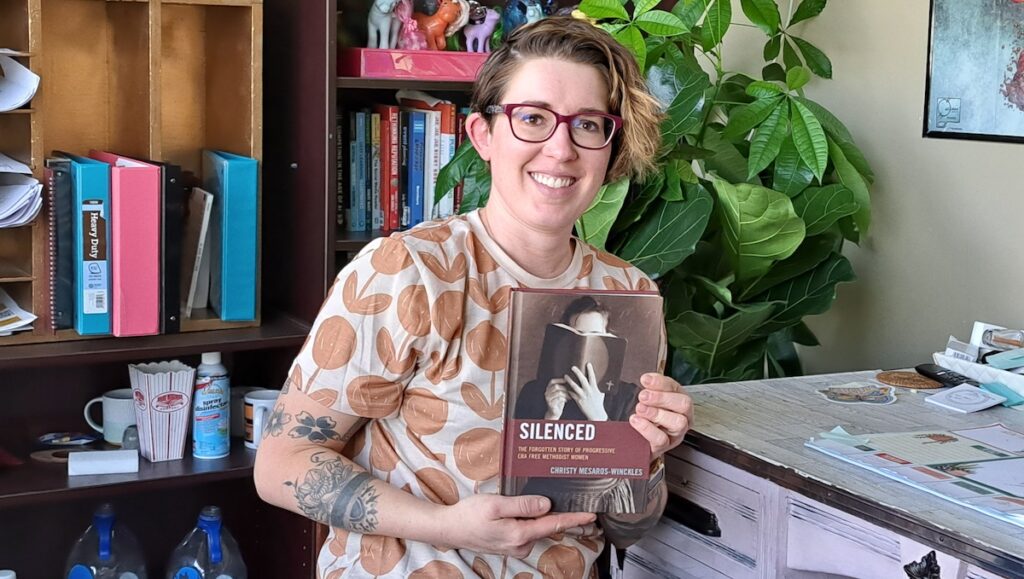
ADRIAN — In the last part of the 19th Century and into the early 20th, Clara Wetherald, Ida Gage, Anna Grant, Eliza Witherspoon, Anne Bright, Blanche Stamp, and others like them broke new ground as women evangelists in the Free Methodist Church.
But until Christy Mesaros-Winckles, an associate professor of communications arts and sciences at Adrian College, unearthed their stories for her recent book “Silenced: The Forgotten Story of Progressive Era Free Methodist Women,” all these women’s names were pretty much lost to history.
“Silenced,” published in September 2023 by Lexington Books, traces the gender-role debate within the Free Methodist Church, especially regarding the ministry.
Women such as Wetherald, Gage, and Grant were licensed Free Methodist evangelists at a time when women were expected to be stay-at-home wives and mothers — and, although as evangelists they were able to preach, they were not allowed by the denomination to be ordained.
Ordination as elders in the Free Methodist church, in fact, was not open to women until 1974, although some intermediate steps did come prior to then that “Silenced” looks at as well.
Mesaros-Winckles first came across these pioneering female evangelists while researching her doctoral dissertation in 2010, and found that their stories lingered with her. “I came back to this over and over again, kept playing around with it,” she said. “I knew there was something there.”
And ultimately, her new book took shape.
The story begins in the 1880s, when the question of women’s ordination in the Free Methodist Church was beginning to be debated. No less of a figure than one of Free Methodism’s founders, B.T. Roberts, was all in favor of the idea, but plenty of people in the denomination were not.
As evangelists rather than ordained ministers, the women whom Mesaros-Winckles writes about were not allowed to baptize, perform weddings, or serve communion.
Some of the women had husbands who were ordained ministers and worked alongside them. Blanche Stamp’s husband, Christopher, for instance, clearly thought of himself and his wife as a team. Anna Grant — a medical doctor by training — had a husband, John, who was not a minister, but was so fully supportive that he cared for the children while she was away on her evangelism travels.
On the other hand, “a lot of these marriages couldn’t withstand it,” Mesaros-Winckles said. Gage and Wetherald were among those who divorced their husbands. Wetherald also left Free Methodism completely, joining the Congregationalist Church where she could be ordained.
Why did Mesaros-Winckles — who, not incidentally, became a Free Methodist deacon herself, as did her husband, Andrew — find the stories of these early Free Methodist women so compelling?
“I see parts of myself in them,” she said. “With Clara and Anna, I see their drive. With Anna, too, it’s the strength of the marriage she and John had.” And as for Ida Gage, “Ida’s a spitfire. … She just did what she wanted.”
Because these women evangelists’ stories have never truly been told, she knows her book fills a real gap in the historical record. “There’s so much history here that’s nowhere else,” she said.
To that end, while the audience for “Silenced” certainly includes academics and libraries, she hopes anyone interested in history in general, and women’s history in particular, will want to read it.
“I wrote it in such a way that I’d love to see people interested in women’s ministry pick it up. It’s intentionally not jargon-y,” she said.
While Mesaros-Winckles has a long list of papers and other such writings to her name, this is her first book. “I always wanted to do a book and now I have,” she said. “And it’s really exciting.”
“Silenced: The Forgotten Story of Progressive Era Free Methodist Women” is available in both hardcover and e-book form from Amazon or through the publisher’s website, which currently is offering a 30% discount by using the code LXFANDF30. Customers can also call 1-800-462-6420 to order.

